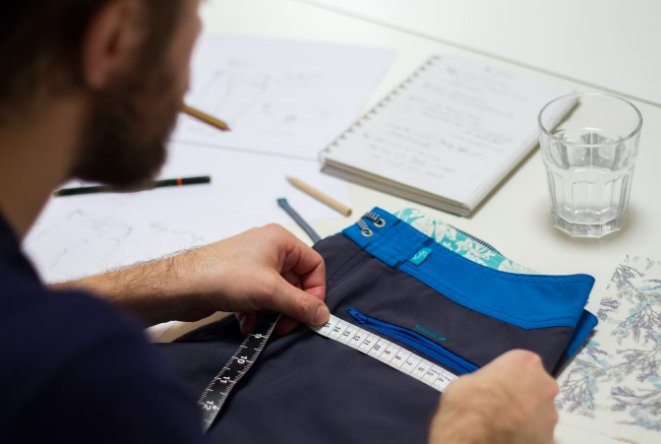In order to take on the market for men’s swimwear, Riz Smith set out to design a gorgeous pair of boardshorts with tailoring that would make Saville Row proud.
He co-founded Riz, an ethical manufacturer of sustainable swimwear, with his business partner Ali Murrell.
Despite the brand’s vibrant, playful, and flamboyant patterns, Riz Smith discusses some of the difficulties in growing a small, environmentally oriented business.
The Success And Failure Of An Eco-Friendly Swimwear Brand
realizing you’re a good company
The most beautiful and environmentally friendly boardshorts in the world, I wrote in a notepad when I was considering starting the business; it gave me a feeling of what I wanted to achieve.
The words “sustainable” or “eco” weren’t as important, but “environmental” felt more sentimental than useful, according to Smith.

“Many individuals start businesses only to make money, but we didn’t do it that way. We set out to “be the greatest at any costs.”
Operating sustainably should be standard practice for the owners, not something to make a big deal out of.
We were really concerned with conducting business “correctly,” but I had no idea how it would operate in a real world setting.
Ali and I have always maintained that we must conduct our business in the same ethical manner that we conduct our personal lives. That is how it ought to be, so why wouldn’t you operate your company ethically?
Why wouldn’t you make sure that everything you do is the proper thing to do? was one of the easy things we did when we first started the firm.
In the same manner that you strive to be a “good person,” we need to do “good business.” That is how it ought to be, so why wouldn’t you operate your company ethically?
Choosing your own path
The adoption of an eco-friendly swimsuit fabric is one of the brand’s unique selling points.
“I’ve always known I wanted to make our shorts out of recycled polyester. I discovered it while attending all the fabric shows in my former position as Head of Global Design for Speedo.
There is no real reason why it isn’t utilized more because the cost is only slightly higher. According to Smith, “I believe major firms are terrified of being perceived as an eco brand and they dislike change.
“Having a sustainable business makes us feel better, but when we go into a shop, they really don’t care. Though I do think things will change, especially when looking at the younger generation. I think they genuinely care, and I think being eco-friendly and sustainable will just become the standard.
Clothing that is created unethically will be frowned upon.
Since its introduction five years ago, the brand has gradually gained popularity and is currently carried in a few boutiques in the UK, Japan, Australia, and Richard Branson’s Necker Island.
Each tiny batch has prints that have a “British-Hawaiian” feel and is digitally produced with water-based inks.
“Many individuals start businesses only to make money, but we didn’t do it that way.
We set out to do everything it takes to be the greatest. Therefore, it’s okay if things move a little more slowly or if we continue to focus on a certain market. It took us five years to improve the margins and figure out what works and what doesn’t.”
Supporting a charity
In its five-year history, Riz has given money and shorts to a number of organizations, but it’s simple to spread a brand too thin and lessen the value of the affiliation.
“We mostly support the Marine Conservation Society; we work with them on beach clean-ups and donate money, but it’s a real sum of money.
We help the seas because we appreciate the thought of returning the favor. Really, it’s quite straightforward,” says Smith.
Beach shorts by Riz are blue and are worn by a model.
Focusing on British and maritime pictures with distinctively vibrant patterns
building a supply chain from scratch
Although Riz prefers to be renowned for producing one product extremely well rather than diversifying, the founders’ ongoing education on fabric and plastic recycling gave rise to the idea of producing their own recycled fabric from plastic bottles the business has gathered.
Smith said that the goal is to create shorts from ocean plastic that can be worn in the water again.
But the truth is a little more nuanced.
“Making your own fabric out of plastic that others have gathered from beaches requires tremendous logistics.
Although the mill will only accept 50,000, we estimate that 20 tiny water bottles create a pair of shorts.
To make this big vision a reality, the brand must overcome a few obstacles.
First of all, the fabric mill runs nonstop and won’t stop so people can pour their own bottles in because it would merely add to the constantly pouring bulk. Thousands of bottles are crushed into polymers at the mill to manufacture the recycled polyster.
In the big picture, this definitely benefits the seas, but it prevents people from linking the shorts to their recycling efforts. The other is that several bottles are used to produce a lot of cloth that is unnecessary.
Last but not least, there don’t seem to be enough bottles that need to be collected.
“Right present, we have about 20,000 bottles.
When we have this thought in mind, we’ve gone to several beach clean-ups when there aren’t any bottles, which is excellent for the beaches but bad for us.
Then there’s the matter of the money, time, and energy. We’ve been cleaning up the Thames shoreline a lot and have collected 50 bottles, but we need at least 50,000.
We’re discovering a lot about what is and isn’t possible.
We want to perhaps pull the curtain a little bit on it all. We want to be completely open and honest by stating that what we had in mind was not feasible but that we were still considering our choices.
The focus is now shifting from all the plastic coming from the water to preventing the plastic from reaching the ocean, and they are turning to festival organizers to get their hands on the hundreds of thousands of bottles left behind by revelers.
It all comes down to trying, at the end of the day.
attempting to alter the current situation, researching new procedures, and exploring options. It works and doesn’t work occasionally.
Why not try something fresh, asks Smith, if you’re going to set up anything on your own? “You want to do everything that you detested about the corporate world.”
